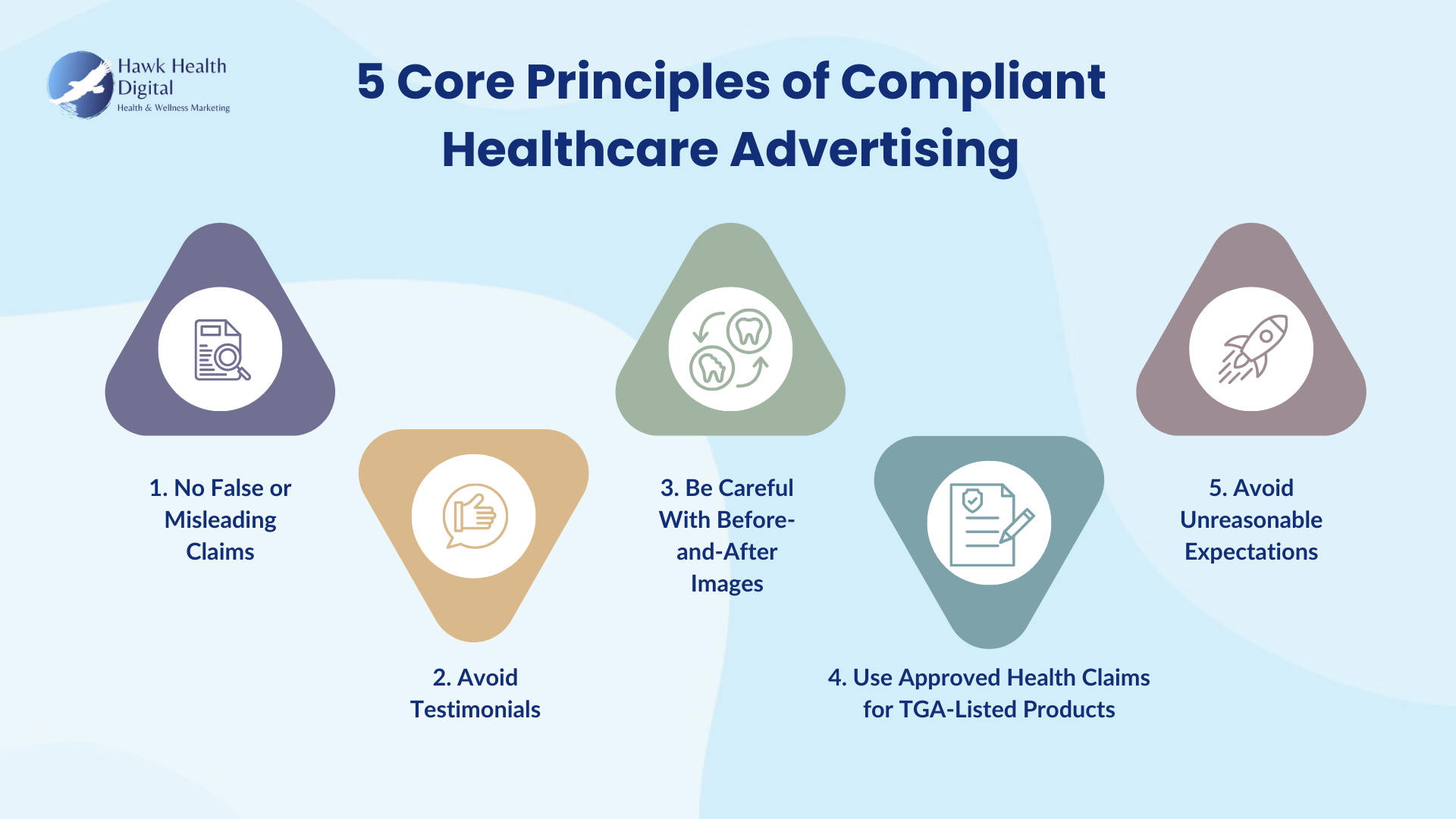Healthcare Marketing Compliance in Advertising: What You Need to Know
 In today’s digital-first world, advertising is a critical part of growing any healthcare business. From Google search ads and social media campaigns to website content and email newsletters, healthcare marketing helps you connect with the right patients, build your reputation, and support the overall growth of your practice. However, healthcare marketing isn’t like advertising for retail or hospitality - there are strict regulations in place to protect patients, ensure accurate information, and maintain public trust in health practitioners and services.
In today’s digital-first world, advertising is a critical part of growing any healthcare business. From Google search ads and social media campaigns to website content and email newsletters, healthcare marketing helps you connect with the right patients, build your reputation, and support the overall growth of your practice. However, healthcare marketing isn’t like advertising for retail or hospitality - there are strict regulations in place to protect patients, ensure accurate information, and maintain public trust in health practitioners and services.
Unlike many other industries, advertising in healthcare must navigate unique legal and ethical standards. The obligations are stringent because the potential consequences of misleading, exaggerated, or false claims are so great. Not only can such breaches harm individuals seeking care, but they can also erode confidence in the industry as a whole. Regulations are designed to safeguard patients from being misled, oversold, or promised unrealistic outcomes, whether intentionally or by omission.
For healthcare providers, staying compliant isn’t optional, it’s essential. Laws and regulations from bodies like AHPRA and the TGA dictate what you can say, how you present results, and even the kinds of images or testimonials you can use in your marketing. A non-compliant ad can quickly damage your reputation, attract significant penalties and fines, trigger regulatory audits or investigations, and sometimes even lead to legal action or loss of licensure.
The stakes are high: a single error can undo years of trust-building or jeopardise your registration. Yet, compliance shouldn’t be viewed as a burden. Rather, it’s an opportunity to set yourself apart as an ethical, patient-first provider who prioritises transparency and responsibility.
In this blog, we’ll break down the key principles of healthcare marketing compliance in Australia (with relevance globally), the common pitfalls to avoid, and how to market ethically and effectively—so you can grow with confidence and integrity.
Table of Contents
1. Core Principles of Compliant Healthcare Advertising
2. Compliance Considerations by Channel
3. Tips to Stay Compliant and Effective
Why Compliance Matters in Healthcare Advertising
Healthcare professionals are held to a higher standard because of the serious nature of their services. Advertising must be truthful, evidence-based, and free from misleading or deceptive claims. This higher standard reflects the trust placed in health providers by the public- patients often make decisions based on your messaging that could directly impact their health and wellbeing. That means accuracy, clarity, and honesty must underpin every piece of your marketing and communication.
It’s also important to remember that the intention behind your advertising doesn’t matter; if an ad is found to be misleading, exaggerated, or lacking proper evidence, you are still responsible as a practitioner or business owner. This extends to all communications, including websites, brochures, social media, and third-party platforms.
Failing to comply with advertising laws and guidelines - such as those set out by AHPRA (Australian Health Practitioner Regulation Agency) or the TGA (Therapeutic Goods Administration) - can lead to a range of significant consequences:
- Investigations or audits: Regulatory bodies may initiate detailed investigations into your practice and advertising if they suspect non-compliance, sometimes leading to ongoing scrutiny or demands for corrective action.
- Regulatory warnings or fines: Penalties for breaches can include formal warnings, public cautions, and substantial fines. In serious or repeated cases, your ability to advertise, or even to practise, may be restricted.
- Loss of trust with current and future patients: Patients rely on healthcare marketing to make informed choices. Non-compliant advertising can undermine their confidence in your expertise and integrity, and word of any breaches often spreads quickly—both in the community and online.
- Damage to your brand and credibility: News of compliance failures, regulatory action, or negative publicity can erode the reputation you’ve worked hard to build. Recovering from a public loss of credibility can take years and significantly limit your growth potential.
- Potential legal action and loss of licensure: In severe breaches, you could face court action, suspension of registration, or removal from professional practice.
Ultimately, compliance in advertising should be seen not only as a legal responsibility but also as a commitment to ethical care. It protects both your patients and your practice, setting you apart as a trusted provider in the community.
Core Principles of Compliant Healthcare Advertising

Here are the key compliance principles every healthcare advertiser must follow:
1. No False or Misleading Claims
All claims in your advertising must be honest, accurate, and backed by credible evidence. This means you cannot exaggerate the benefits of your services, suggest outcomes that aren’t supported by research, or use ambiguous language to imply superiority without proof. Even seemingly small statements can breach compliance if they are misleading or imply guaranteed results. Be especially cautious with phrases like “cure,” “instant recovery,” or “permanent results,” as these can set unrealistic expectations and land you in regulatory trouble.
✅ Compliant: “Our podiatrists use evidence-based treatment techniques to help manage chronic heel pain.”
🚫 Non-compliant: “We guarantee to cure your heel pain permanently.”
2. Avoid Testimonials
Australian law, via AHPRA, prohibits the use of testimonials for regulated health services. This means you cannot feature Google reviews, patient quotes, star ratings, or even positive social media comments in your marketing - no matter how authentic or unsolicited they are.
This rule applies to all forms of advertising, including your website, print, and social media posts. Instead, focus on education and share clinical case studies that explain your approach without making unsubstantiated claims or relying on patient endorsements.
3. Be Careful With Before-and-After Images
Before-and-after imagery can mislead if not presented with transparency and consistency. If you use this type of visual content, it must show comparable conditions - same lighting, angle, and context - without any digital enhancements or dramatic staging. You should also ensure that these images fairly represent typical results, not just your best successes. Always keep clear documentation to support that any images used comply with these requirements. When in doubt, it’s safest to opt for neutral visuals or diagrams that explain concepts without showing individual results.
4. Use Approved Health Claims for TGA-Listed Products
Advertising for therapeutic goods (including supplements and medical devices) must use only TGA-approved claims from the Australian Register of Therapeutic Goods (ARTG). You cannot promote benefits or functions of these products beyond what is officially listed. Be especially careful to avoid suggesting your product can cure or prevent illnesses unless you have explicit TGA approval for that exact wording.
5. Avoid Unreasonable Expectations
Advertising must not suggest that your services or products can deliver instant, guaranteed, painless, or risk-free results. Your messaging should clearly state realistic timeframes, likely outcomes, and any qualifications required. Always encourage patients to make informed decisions based on balanced, factual information rather than hype.
✅ “Most patients begin to see improvement within a few weeks.”
🚫 “Instant results with no recovery time!”
Adhering to these principles means you are not only protecting yourself from regulatory issues but also building a foundation of honesty and trust with your audience—key to long-term success in healthcare marketing.
Compliance Considerations by Channel
Google Ads
Running healthcare ads on Google involves navigating both regulatory guidelines and Google’s own advertising policies.
Google restricts a wide range of healthcare keywords, including those related to prescription medications, treatments for “sensitive” medical areas, and certain procedures. In many cases, you’ll need to obtain special certification to promote health-related products or services, especially if your ads mention pharmaceutical ingredients, vaccines, or medical devices.
Google’s ad policies also prohibit mentioning specific patient conditions or symptoms in your headlines or ad text (e.g., “Are you suffering from chronic knee pain?”). Instead, structure your campaigns to focus on the services, approach, or expertise of your practice.
Always review Google’s changing healthcare guidelines, as non-compliant ads can be disapproved, your account suspended, or your reach limited unexpectedly.
Facebook & Instagram
Meta platforms, including Facebook and Instagram, have their own robust set of advertising rules that are particularly strict in health.
You must not target or address users in a way that references their personal attributes or health conditions - statements like “Are you struggling with back pain?” or even targeted “before and after” result ads are not allowed.
Meta’s policies favour privacy and dignity, requiring you to focus messaging on the benefits of your services and your credentials, rather than direct appeals to individual health struggles or insecurities. Use clear, general language, steering clear of promises, guarantees, and sensitive imagery. Consistent violations can result in ad rejection or even loss of ad privileges.
Your Website
Your clinic website is the cornerstone of your online marketing, and it must reflect the highest standards for medical accuracy and reliability. All website content, including blog posts, landing pages, and service descriptions, should be written or reviewed by qualified health professionals, ensuring it is both evidence-based and up to date.
Avoid publishing patient testimonials or “success stories,” unless you are absolutely certain they meet all AHPRA guidelines.
Clearly separate clinical information from promotional content, avoiding language that could be seen as misleading, exaggerated, or offering guaranteed outcomes. Always use disclaimers where relevant (e.g., “Results may vary for each patient”) and routinely review your website to ensure ongoing compliance as regulations change.
Patient stories, case studies, and images must be handled with sensitivity to privacy and full adherence to ethical guidelines. A compliant website builds patient trust and reduces the risk of reputational or legal issues for your business.
Tips to Stay Compliant and Effective
Develop a Content Approval Process
Put a formal system in place to review every ad, social post, email, or landing page before it goes live. Assign compliance checkpoints or use a pre-publishing checklist to catch any claims or visuals that may breach guidelines. Involve both marketing and compliance team members to ensure nothing slips through the cracks.
Involve Clinical Staff
Collaborate closely with qualified practitioners at every stage of campaign development. This ensures all messaging, statistics, and health information are reviewed for medical accuracy and reflect current standards of care. Their expertise is essential for validating claims and providing up-to-date perspectives as guidelines change.
Keep Records
Maintain well-organised documentation for all marketing assets. This includes source material for claims, medical studies cited, data supporting statistics, and sign-off records for every campaign. These records are your first line of defense in the event of a regulator’s inquiry or an audit. Include evidence of who approved what and when, in case authorities require proof.
Educate Your Team
Conduct regular training sessions to make sure everyone involved in your marketing (in-house staff, contractors, consultants, etc.) understands the requirements and risks of healthcare compliance. Update your team on changes to laws and best practices, and use real-world scenarios to reinforce key principles. An informed team is less likely to make costly mistakes.
Work With Specialists
Consider partnering with a marketing agency specialising in healthcare, especially if you’re growing fast or running complex campaigns. These experts bring industry-specific knowledge and experience, ensuring your advertising is not only compliant and ethical but also as impactful as possible. They can also guide you through regulatory updates and quickly flag emerging risks.
Stay Proactive
Conduct regular audits of your published content, remove outdated or non-compliant material, and subscribe to updates from regulatory bodies. Set up alerts for changes in advertising law or guidelines. By making compliance a continuous priority, you’ll protect your business, support your brand’s reputation, and give your patients the assurance they deserve.
Final Thoughts
Marketing your healthcare business doesn’t have to feel like walking a tightrope. When done right, compliant advertising builds trust, improves patient understanding, and drives growth - without crossing regulatory lines.
Remember, compliance is not just about avoiding fines or regulatory action; it’s about upholding your professional integrity, protecting your patients, and supporting the reputation of your entire practice. By putting ethics and accuracy at the core of your campaigns, you create a foundation for sustainable marketing success and genuine patient loyalty.
Take the time to educate your team, involve clinical experts, and maintain transparency in every campaign. Use robust approval processes and ongoing training to keep up with regulations and best practices. Embrace compliance as an opportunity to set your brand apart as a safe, trustworthy choice in an often confusing healthcare landscape.
By following these principles, you can promote your services confidently and responsibly, knowing you’re helping patients make informed decisions - and fostering the kind of community trust that leads to lasting growth and a stronger, more resilient business.
Need Help with Healthcare Marketing Compliance?
At Hawk Health Digital, we specialise in ethical, high-performing campaigns for healthcare businesses. Whether you’re launching Google Ads or refreshing your website, we’ll make sure your marketing works - and stays compliant.

.png?width=200&height=100&name=Health%20Hawk%20Digital_Horizontal%20(3).png)

